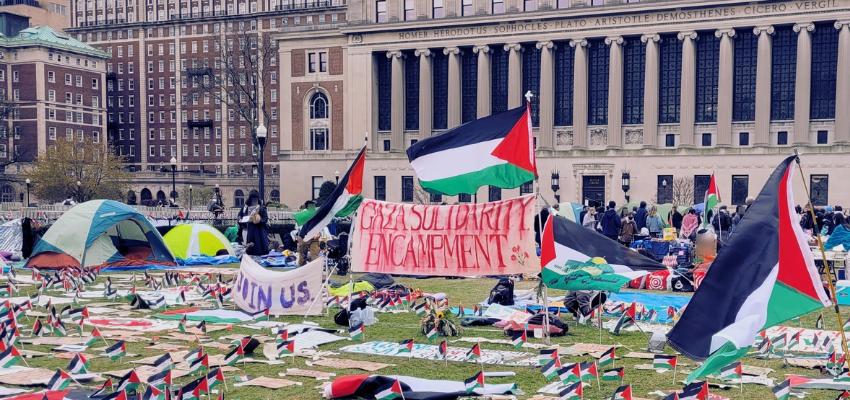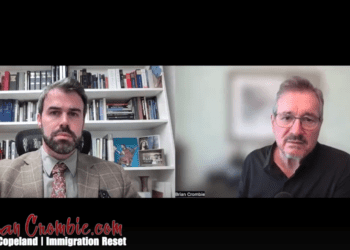By Sergio R. Karas, May 15, 2024
The federal government’s plan to allow Palestinians from Gaza to come to Canada presents serious security risks.
Despite the screening protocols associated with the temporary measures for Gazans who have relatives in Canada, the prospect of a significant influx of Gazans raises legitimate concerns about the exacerbation of rising antisemitism, the incitement of violence against Jewish Canadians, and the escalation of social unrest.
Recent anti-Israel and antisemitic organized protests, such as unauthorized campus encampments at universities countrywide, highlight the pressing need for immediate government action and strict security measures.
It is no secret that the Canadian government has faced critical challenges in facilitating the relocation of Palestinians from Gaza. Despite processing close to a thousand applications, as of now, not a single individual has been granted admission under the program.
A primary hurdle arises from the difficulties faced by many visa applicants when attempting to enter Egypt for mandatory biometric screening. According to the former Canadian ambassador to Israel, Jon Allen, individuals from Gaza have used alternative routes, arranging costly departures through private Egyptian firms that allegedly engage in bribery involving Egyptian border guards and possibly Hamas operatives.
Concerns regarding the unofficial methods employed by Gazans at the Rafah border crossing into Egypt have led to visa cancellations on security grounds by Australia and other countries.
Controversy also surrounds the document requirements for Gazans seeking visas. Applicants must have up-to-date passports and provide thorough disclosure of personal backgrounds, encompassing employment records and social media activity. Critics argue that these measures are overly invasive and hard to comply with, and have pushed for more lenient criteria.
However, robust screening procedures are essential for safeguarding national security. If anything, the program’s inability to admit even a single Gazan who passes all security screenings and is allowed entry through legitimate channels emphasizes the immense challenge of vetting individuals from this region. It also highlights the considerable security risks tied to this temporary program initiative.
In the United States, the Biden Administration has floated the idea of accepting Gazan refugees, but Republican lawmakers have panned the plan, citing security concerns relating to the widespread support of Hamas among Palestinians and the potential risk of admitting individuals with ties to terrorism.
The New York Post echoed this sentiment in an editorial on May 1, emphasizing the need for stringent vetting procedures to prevent the entry of Hamas sympathizers from Gaza.
Given the steep rise of antisemitism since the October 7, 2023, Hamas terror attacks on Israel, the US and Canada have valid reasons to be concerned about welcoming refugees with potential anti-Jewish sentiments. Since Hamas’s stated goal is to destroy the state of Israel and its Jewish citizens, an influx of Gazan refugees could exacerbate tensions and hostility domestically as the conflict continues in the Middle East.
Screening for members and sympathizers of Hamas complicates the vetting process given the substantial support for the terror group among Palestinians in the West Bank and Gaza. A survey conducted in March 2024 highlighted this support, revealing that 71 percent endorsed Hamas’s October 7 terror attack, and 59 percent preferred Hamas to govern Gaza. Only five percent of Palestinians viewed Hamas’s actions on October 7 as constituting a war crime.
Furthermore, widespread frustration with the international community’s perceived stance on international humanitarian law and the situation in Gaza has fuelled significant levels of anti-American and anti-Western sentiments among Palestinians and their allies in the left and academia.
Palestinian children are systematically indoctrinated to hate Israel and the Jewish people from an early age. Textbooks endorsed by Hamas distort historical truths regarding Palestinians and Israel while promoting antisemitic tropes and violence against Jews.
Moreover, staff in schools in the West Bank and Gaza Strip have repeatedly been implicated in endorsing violence against Jews and propagating antisemitic ideologies. This indoctrination extends to Hamas-operated summer camps, where children undergo military-style training, don uniforms, handle weapons and learn combat techniques, creating a pipeline of recruits for Hamas and other terrorist organizations.
The Canadian Security Intelligence Service has expressed concerns about a rise in violent religious and ideological extremism fuelled by the Israel-Hamas conflict. Similarly, the Integrated Terrorism Assessment Centre has flagged the risk of attacks on protests, diplomatic posts or other symbols associated with Israeli interests in Canada.
Notably, these alerts precede any significant increase in the arrival of individuals from Gaza, suggesting an ongoing trend of radicalization. If there was a surge of Gazans entering Canada, it could contribute to more social unrest.
It is important to note that Canadian immigration authorities have historically struggled to address security concerns, as evidenced by difficulties in identifying and removing individuals associated with terrorism or human rights violations.
This challenge is exemplified in cases such as that of Helmut Oberlander, who concealed his Nazi ties when immigrating to Canada in 1954 and was eventually ordered deported 35 years later but died before the order could be executed.
Similarly, the lengthy deportation process of Léon Mugesera, a former prominent Rwandan politician convicted of inciting violence against Tutsis during the genocide in Rwanda, took more than a decade before his deportation from Canada in 2012.
In addition, the deportation of Mahmoud Mohammad Issa Mohammad, a Popular Front for the Liberation of Palestine terrorist convicted for his role in a deadly attack on an Israeli plane at Athens airport in the 1960s, took a staggering 26-year legal battle before he was finally expelled from Canada. Alarmingly, he not only managed to mislead Canadian officials about his identity and terrorist background, but he also took advantage of Canada’s slow legal process to prolong his stay significantly even after being ordered deported.
These incidents raise concerns about Canada inadvertently providing refuge to dangerous individuals. The potential for someone with ties to Hamas to circumvent security screenings and remain undetected is very real.
The security risks associated with admitting Palestinians from Gaza are not hypothetical. Despite vetting processes, there remains a real danger of importing ideologies that could stoke hostility towards Jewish Canadians. This concern is underscored by the exponential uptick in organized antisemitic incidents, particularly in academic settings.
Recent unauthorized encampments and protests on Canadian university campuses serve as stark examples of the consequences to society when influencers disrupt public spaces without consequences. They pose a significant risk to the integrity of Canadian universities and free academic exchanges, jeopardizing foundational values of diversity and tolerance, and fostering division in our communities.
In 2024, a study led by University of Toronto sociologist Robert Brym revealed that certain segments of the Canadian population, including Muslims, Quebecers, and non-Jewish university students, exhibited heightened levels of negative views toward Jews and Israel compared to the general population. Brym warns that a rise in individuals harbouring such sentiments could intensify societal tensions, particularly as surveys indicate a tendency for anti-Jewish sentiments among Muslims to escalate during periods of conflict.
Considering that more than a quarter of Canada’s 1.8 million Muslims have immigrated since 2011, there is a pressing need for comprehensive education aimed at fostering the rejection of antisemitism and sectarian violence among newcomers, regardless of their cultural backgrounds.
Canadian universities have long implemented stringent policies to prevent disruptions to learning, such as encampments and occupations. They have codes of conduct where penalties for serious violations can result in suspension or expulsion, but they are rarely enforced. There is anecdotal evidence that some of the agitators are foreign students.
The federal, provincial, and local governments must unequivocally require these institutions to enforce these policies and take a firm stance against foreign students participating in unlawful protests or harassment of Jewish students.
Legislative proposals, like the No Visas for Anti-Semitic Students Act in the US Congress, would require the revocation of study permits for foreign students associated with antisemitic organizations or expressing antisemitic sentiments. Canada should adopt similar measures, empowering immigration authorities to deport foreign students involved in unlawful activities.
Foreign students are required to adhere to study permit conditions, which involve engagement in full-time studies at a designated learning institution. Individuals found to violate their school code of conduct or participating in illegal activities resulting in expulsion or suspension are in breach of their study permits and should be subject to immediate deportation.
These students must be counselled when receiving their permits that their presence in Canada is solely for educational purposes. For those who do not respect these conditions, deportation is a necessary measure to ensure the safety of the student body and society at large.
In a recent column in the National Post, retired Canadian Armed Forces general Rick Hillier emphasized the crucial necessity of enforcing hate, threat, and violence laws to protect Canadian citizens. He advocates for decisive measures, such as arresting offenders and deporting non-Canadian lawbreakers.
With incidents involving foreign students involved in antisemitic activities and unlawful behaviours on the rise, Canada must take a stronger stance against study permit violators and those inciting fear and violence.
Ensuring the safety and welfare of our citizens must be the top priority in Canada’s approach to immigration issues. This demands a proactive strategy for identifying and addressing potential threats. Only then can Canada maintain the integrity of its institutions and uphold a society built on principles of respect and tolerance.
Sergio R. Karas, principal of Karas Immigration Law Professional Corporation, is a certified specialist in Canadian citizenship and immigration law by the Law Society of Ontario. He is co-chair of the ABA International Law Section Immigration and Naturalization Committee, past chair of the Ontario Bar Association Citizenship and Immigration Section, past chair of the International Bar Association Immigration and Nationality Committee, and a fellow of the American Bar Foundation. He can be reached at karas@karas.ca.






